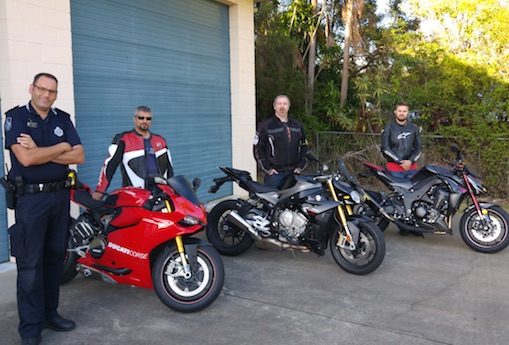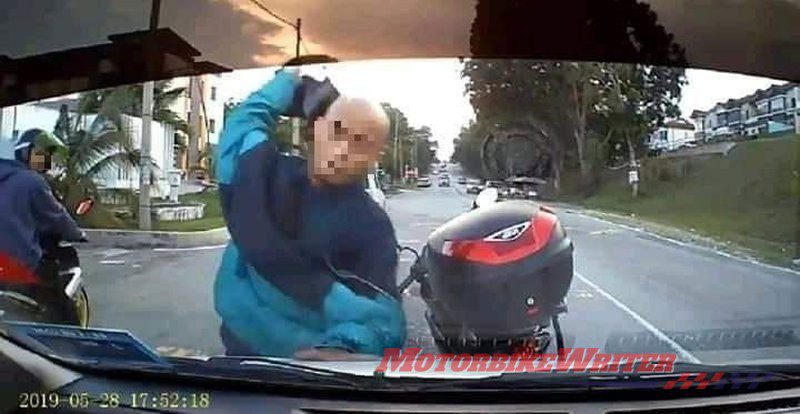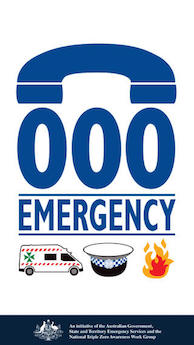We all get annoyed and frustrated by drivers doing the wrong thing, but it doesn’t pay to loose your cool like this Malaysian rider did.
Danial Abdullah Tan, 31, says the female driver of the car tailgated him, blew her horn and almost crashed into him twice before overtaking him.
So he passed the driver, hopped off his scooter and smashed her windscreen with his helmet.
Driver Perodua Alza says the riders were chatting and holding her up.
She posted her dashcam video on Twitter where it went viral and helped police catch the road-raging rider.
https://twitter.com/i/status/1133776384298323969
He pleaded guilty and will now spend 12 months in jail.
Not only was that a hefty punishment, but he will no doubt need to pay for a new helmet when he gets out!

Road rage doesn’t pay
We have said before that road rage by riders against cars and trucks is a no-win situation.
They are bigger than us and it can end in tragedy.
Most riders have experienced aggressive, inconsiderate, rude, uneducated, distracted, dangerous and plain incompetent drivers on the road.
But we should do all that we can to avoid being lured into road rage as it usually does not pay.
Queensland Police Senior Sergeant Ian Park who created the #ridesafely4me Facebook site says he’s not sure if it’s perception or reality, but “our roads appear to be becoming angrier places”.
“Unfortunately, it seems to involve individuals from all road user groups as both the victims and the perpetrators.
“Motorcyclists and bicyclists are of course the most vulnerable due to the lack of physical protection around them. But the fundamentals of personal safety of the roads are no different to anywhere else,” he says.

IAN’S TIPS TO AVOID ROAD RAGE
If you find yourself feeling unsafe as a result of the actions of another road user, the first priority is to remove yourself from the situation as safely as possible. Unfortunately far too often incidents of poor behaviour by one road user to another are only exacerbated when the ‘victim’ retaliates. If another party chooses to yell at you, beep their horn or flash their lights – so what? Let them get it out of their system and get on their way. Inflaming the situation by ‘biting back’ rarely assists, and often only makes the situation more unsafe for everyone.
However if the other party continues to behave in a manner that makes you feel unsafe, then consider your environment. Perhaps pull into a service station, licensed premises or shopping centre that is likely to be fitted with external CCTV. This will often discourage the aggressor from taking the matter further if they know their actions (and registration details) are going to be recorded.
If no such place is available continue to drive without reacting to the aggressor until a place of safety is available, avoid making eye contact and attempt to disengage from the situation as best and safely as you can.
If you feel that you are in imminent danger, pull over and call triple zero (000). Don’t forget that ‘000’ from a mobile phone doesn’t necessarily go to your nearest operator, so always be ready to say ‘I need police in (name of City/town or nearest regional centre)’.
When speaking with a 000 operator, pass on relevant information that could assist police to investigate the matter, for example, registration details, descriptions of the person/s in the vehicle, time, date, correct location (in case there are traffic monitoring cameras located nearby etc.), descriptions about any features of the vehicle that are not standard (i.e. post factory fitted wheels, decorations, accessories, damage).
If you carry any kind of video recording device, ensure the footage is set aside so that it doesn’t get recorded over before being provided to police. Make sure you don’t just secure the footage of the incident – also keep footage leading up to and beyond the incident to help clarify any potential counter claims by the other party that it was actually you that was the aggressor.
If the situation is over, but you are still of the belief that the matter warrants investigation with a view to action by police, you always have the right to report it. You can either attend your nearest open police station to speak to someone, contact the non-urgent police reporting number which is now 131 444 in almost all Australian Police Jurisdictions. Similarly most policing services across Australia also provide on-line reporting services. Just search the police service in your State or Territory to find their websites and follow the prompts.
Be mindful, however that any complaint of an incident involving one person upon another without any supporting evidence is often difficult to successfully prosecute. A successful prosecution requires sufficient evidence being presented to a court to determine that an offence was committed beyond reasonable doubt.
However, this should not prevent you from reporting the matter, but is something to keep in mind if police determine there is not sufficient evidence for a matter to proceed. It doesn’t necessarily mean police don’t believe you! If you provide police with a video recording you must be willing and able to give evidence.



